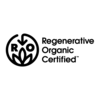
Regenerative Organic certified
Standard Owners (1)
| Name | Country | |
|---|---|---|
| REGENERATIVE ORGANIC ALLIANCE | 🇺🇸 United States |
About (Regenerative Organic certified)
Regenerative Organic Certification (ROC) is a comprehensive and rigorous certification program that goes beyond organic standards to promote soil health, animal welfare, and social fairness. It is designed to recognize and support regenerative farming practices that restore and improve the health of ecosystems, enhance biodiversity, and mitigate climate change.
The Regenerative Organic Certification is built upon three key pillars:
Soil health: ROC emphasizes the importance of building healthy soils through practices such as cover cropping, crop rotation, composting, and minimizing tillage. These practices increase organic matter, enhance water retention, promote carbon sequestration, and support beneficial soil microorganisms.
Animal welfare: The certification requires high standards for animal welfare, including providing animals with access to pasture, promoting natural behaviors, and ensuring humane treatment throughout their lives.
Social fairness: ROC places a strong emphasis on social equity and fairness by requiring farms to demonstrate fair labor practices, including fair wages, safe working conditions, and respect for workers' rights. The certification also encourages community involvement and support for local economies.
To achieve Regenerative Organic Certification, farms and businesses must undergo a rigorous assessment process conducted by independent third-party certifiers. The certification covers various agricultural sectors, including crops, livestock, and textile fibers. Additionally, the certification can extend to processed products, such as food and personal care items, that meet the necessary criteria.
The Regenerative Organic Certification provides consumers with a reliable way to identify products that have been produced using regenerative practices that prioritize soil health, animal welfare, and social responsibility. It supports farmers and producers who are committed to regenerative agriculture, which has the potential to address pressing environmental challenges and create a more sustainable and resilient food system.
It is important to note that the Regenerative Organic Certification is a relatively new certification program, and its adoption and availability may vary across different regions and industries. For the most accurate and up-to-date information, it is recommended to refer to the official website of the Regenerative Organic Alliance, the organization responsible for overseeing the certification program.